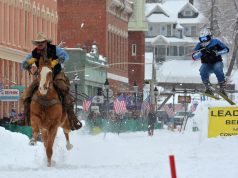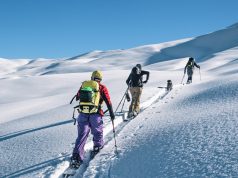
In 2015, on the fifth day of Ride the Rockies (RtR) — an epic multi-day, 465-mile supported bicycle tour of Colorado — I was supposed to reach Cottonwood Pass, which tops out at 12,100 feet, about 35 miles northwest of Salida. My skin felt clammy as we climbed up the pass’s sloping forested, gravel road. It was clear why this snaking path is closed during winter months and why most sensible motorists avoid it even in the warmest of temperatures.
At each rest stop, I drank beet juice, which was supposed to boost my blood oxygen level. The plan was to complete the 103-mile day. Yet, as I grinded up and up, I imagined myself swerving off the mountain, tumbling into the infinite forest or perhaps flying airborne on my bike like Elliot in E.T., either of which were preferable to the pain of thinking about my mother.
My mom’s caregiver had called me the previous night and caught me off guard. It’d been six months since my mom passed away, and my emotions were festering like a wound that might ooze at any given moment. I had just returned to my room in Crested Butte after dinner and was reveling in the “rest day” (only 37 miles) when my phone rang. I didn’t want to hear how she missed my mom, and I couldn’t soothe her. No one could comfort me or fill the void she’d left in my life, either.
Somehow I needed to figure out how to live without my mom, and what I’d realized was this: The only time I was distracted from my mom’s cancer and the grief of her loss was while participating in something physically grueling. Hence my feet pushing the pedals, over and over and over again across the Rocky Mountain skyline.
I was three miles from the top of Cottonwood Pass, at a rest stop, when I leaned over giggling to a friend who was riding with me. I felt drunk, I admitted.
“Ilyse — I’m getting a medic,” she instructed me in her sternest third-grade teacher voice. “Your eyes look like spinning cartoon pinwheels.”
Within minutes I was in the back of an ambulance asking myself why I repeatedly signed up for this event. This wasn’t my first RtR, and during my first two trips, I’d found ample success, but also ample failure. Did I truly believe “Third time’s the charm?” Maybe it was more like “Three strikes, you’re out,” I started to think.

I’m not from Colorado — 12,000 feet of elevation is significant for me. Training at home, amid gray Midwestern skies, what motivated me all winter as I logged hours on a bike trainer was daydreaming about Colorado’s sunshine, exploring its diverse ecological systems and cavorting in cowboy towns with my husband and friends after each day’s ride. I expected to complete most of the seven-day journey based on my winter training, although there was no real way to prepare for mountains when Chicago’s elevation is only 600 feet above sea level. As a result, some years I was more prepared than others.
My first ride in 2010 was for bragging rights. I imagined returning from the ride like an Olympic champion, speeding past the men in my cycling club because I would still possess the “super altitude powers” Colorado cyclists seem to have. It was hard enough, being one of the few women in the club, and I hoped returning with Colorado altitude powers would allow me to maintain high speeds if only for a weekend ride. Six months before that first ride, I began my rigorous indoor training regimen and once it was three months away, I transferred outdoors to accumulate miles in the saddle.
Come June, I was in Colorado, but within hours of starting the seven-day event, I took refuge in a souvenir shop restroom. Chunks of hail were pelting our helmets, and I shivered in line to dry my socks under the hand-dryer. Eventually, the hail subsided, and all I had to do to finish the day was a descent from the Colorado National Monument to Grand Junction. Honestly, I would’ve been content to flag a rescue vehicle for a ride to the end of the route, but it was the first day, and I knew that if I called it quits early, it would set an unwelcome precedent for the rest of the week. I persisted. For this first RtR, my husband and I had raised several thousand dollars for the Livestrong Foundation and I felt motivated to continue.
I clung to the shoulder of the road and allowed riders to stream past me on the slick pavement while I coasted, lightly braking on every switchback. My thoughts veered from acknowledging the splendor of the Rocky Mountains, to gratitude in having the ability (both financial and physical) to participate in a weeklong tour. But ultimately I kept coming back to a sense of guilt in leaving my kids in order to pursue my own adventure.
“You have children!” I imagined my mom thinking about this endurance endeavor, how I left my kids to fly down mountains at speeds one associates with cars rather than bikes. “What are you thinking?”
The sixth day of that first trip featured an ascent over Wolf Creek Pass, which crosses the Continental Divide. The day began with a teasing sense of invincibility: 30 miles of rolling hills. But soon speed turned into a faded memory and the 7-percent grade announced its presence. My legs grew heavy churning sludge at six miles per hour in the easiest gear. I dismounted the bike. Other tired riders followed suit, and we chatted as our cycling shoes clicked the pavement. The “Support and Gear” van appeared, and I waved it down. Once in the van, which typically transports cyclists to the next rest point and will drive anyone to the day’s finish if they so choose, we passed a jackknifed 18-wheeler hanging off the mountain. I knew I had made the right decision. Some mountains are meant to be feared, and this was one of them. I later learned a semi-professional cyclist was severely injured descending, and I felt no shame in calling it quits that day. In 2010, I admit the mountain won.
Back home, I was exhausted and burnt out and didn’t zoom past any of the men in my club. The normal reaction to the post-ride exhaustion would have been to make a pledge never to try RtR again. But as time passed, the memory of the camaraderie and fun I’d had with my group and the stunning beauty of Colorado overtook my fading recollection of tired legs and frustrated riding effort. My mind tricked me into recalling the trip more fondly than it actually was, and before long I vowed to return.
Wolf Creek Pass and I reunited three years later, in 2013, for my second RtR. I’d spent the prior winter grinding a spin bike in the hardest gear. My mom had recently been diagnosed with cancer, and my husband and I dedicated this trip to her by raising money for the Multiple Myeloma Research Foundation. Once again, my mom never quite understood why I found this particular type of “vacation” enjoyable.
Nevertheless, my mom watched my kids while she was in treatment. The moment she became a grandma, there were no conditions or tentative arrangements, there were no last-minute cancellations when it came to spending time with my children. Even when facing a horrible disease, she remained steady, reliable, loving and unconditional. For her sake, I wasn’t going to give myself the luxury of quitting the Wolf Creek Pass ascent this time. “I’m your biggest advocate and your toughest critic,” she used to say, and when I pedaled, her words echoed in my brain. As I approached the crest, bystanders clapped and rang cowbells. I responded, “I couldn’t do this in 2010!”
I cared for my mom for two years as she battled cancer, and she passed away over Thanksgiving weekend in 2014. I found myself at the beginning of a new year with an open schedule and no commitments. I’d stopped working after she was diagnosed but had no desire to return to freelancing graphic design. That winter, cleaning out my childhood home was emotionally exhausting; I needed a long-term goal to fill my days as I was unraveled by my loss.
At my first cycling training class after her funeral, I’d forgotten my bike shoes. The instructor found a pair for me to borrow, and as I sat paralyzed on the bike, he put his hand on my arm and said, “You have to put one foot in front of the other.”
Not long after, I committed to my third RtR, and I realized the ride and I had become “frenemies.” While each trip contained successful moments, there were also frustrating and tearful ones. RtR was like a friend whose company you enjoy but in limited doses; all the “good riding” feelings could disappear on the next hairpin turn and RtR would laugh and maybe roll its eyes at me.

Back in the ambulance in 2015, my friend told the medics about my cartoon eyes, and I was offered the choice to lay on a gurney with an IV in my arm or chug three bottles of Gatorade. I chugged. I was done for the day, and my goal of finishing 102 miles? Obliterated. The next day, I walked the mile of a gravel descent to the Royal Gorge Bridge. I didn’t have the luxury of injuring myself just to say, “I completed it.” I have children who depend on me and couldn’t justify risking a hair-raising descent on a broken gravel backroad only to see if I could manage it without wiping out.
“Do I need to return physically bruised as well as mentally?” I asked myself. Once again, I opted to experience the scenic path as a pedestrian. I didn’t feel bad about it either.
As a girl, my mom used to say I had “big eyes” when ordering in restaurants, meaning what I wanted to try was more than what I could possibly eat. RtR was a menu of delicious adventure, and I wanted to consume it completely because it kept me focused and on track. If I could dive headfirst into an insurmountable goal, I figured, perhaps it could somehow distract me from my abysmal loss. Life without my mom made more sense while training and working toward a goal. But having big eyes, I simply could not swallow the entirety of what lay before me: the rest of my life with my husband, my kids, and more Colorado adventures to come, just minus my mom.
Looking out from the bridge, I realized that was OK. Maybe it was better to savor the smaller bites of triumph on the bike, and in life, and allow myself to let the full course of grief marinate until it became less unwieldy. I would never be finished with Colorado and the abundance of adventure, but I was done with Ride the Rockies.














